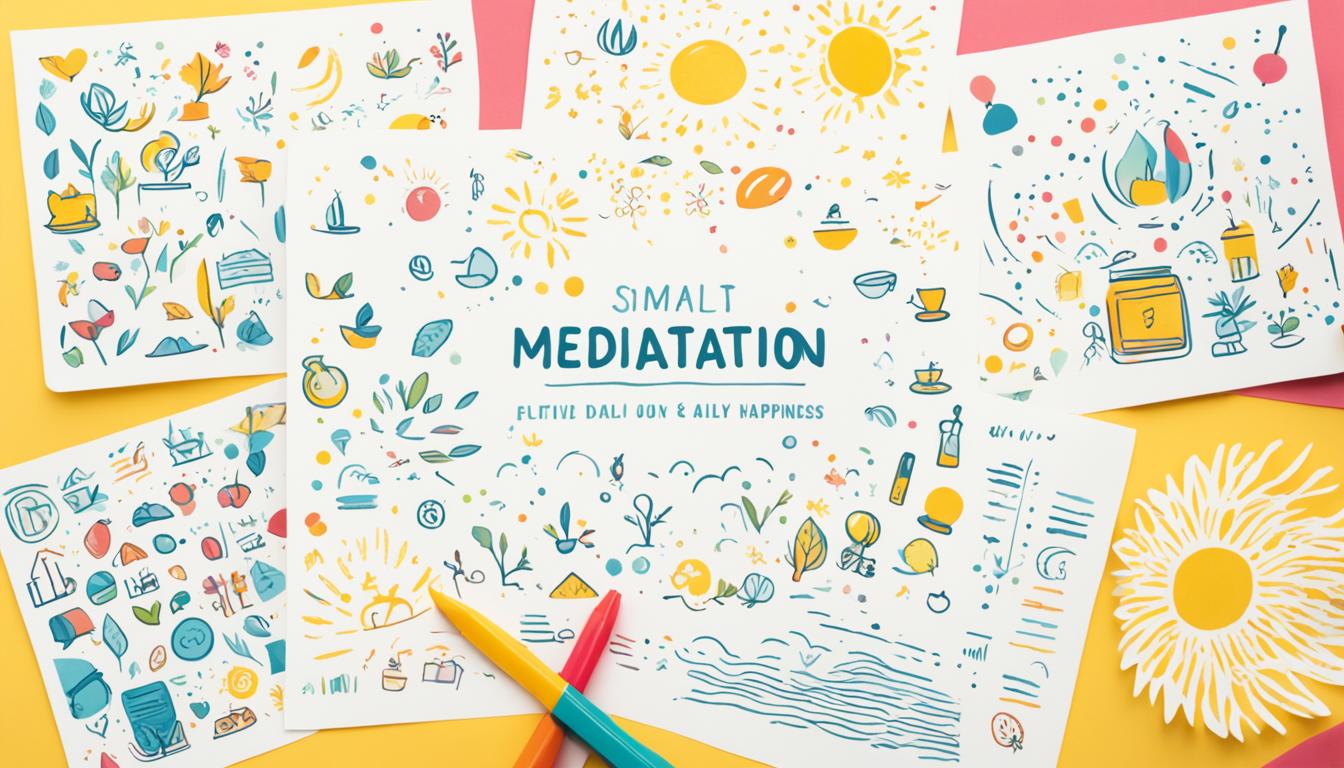The road to happiness is paved with daily habits. Amidst the hustle and bustle of life, it’s easy to lose sight of the simple art of enjoying the ride. But what if there was a way to cultivate happiness through positive habits? Buddhism teaches us that it is possible to find joy and fulfillment by incorporating certain habits into our daily routine.
In this article, we will explore five powerful habits for happiness that have been embraced by happy people throughout history. These habits, when practiced consistently, can transform your outlook on life and create a lasting sense of contentment.
As the famous Buddhist proverb says, “The secret of happiness is not to do what you love, but to love what you do.” This quote reminds us that happiness is not solely dependent on external circumstances, but rather on our internal state of mind and the choices we make.
Key Takeaways:
- Cultivating gratitude fosters a positive perspective and helps you focus on the positive aspects of life.
- Disconnecting from screens and living in the present moment allows for a deeper connection with yourself and your surroundings.
- Mindfulness practices reduce stress, increase self-awareness, and contribute to overall happiness and well-being.
- Nurturing relationships and engaging in acts of kindness create a sense of fulfillment and happiness.
- Personal growth through goal-setting, self-care, and continuous learning brings purpose and direction to life.
The Power of Gratitude
Gratitude is a magical key that unlocks the potential of the present moment. When you pause to reflect on what you’re thankful for, something powerful happens. Your focus shifts from what’s lacking to the abundance in your life. Practicing gratitude allows you to find joy in the smallest of things, making each day brighter and more meaningful. It’s a simple yet profound habit that can transform ordinary days into thanksgivings.
Cultivating gratitude as a daily ritual has the power to change your perspective of the world. It helps you navigate the ups and downs of life, reminding you of the goodness that exists even during challenging times. When you acknowledge and appreciate the blessings in your life, you cultivate a sense of gratefulness that extends beyond yourself. Gratitude becomes a beacon of light that illuminates your path and enriches your relationships with others.
Practicing Gratitude
Integrating a gratitude practice into your daily life can have remarkable effects on your overall well-being. Here are a few simple ways to incorporate gratitude into your routine:
- Keep a gratitude journal: Write down three things you’re grateful for each day. It can be as simple as a beautiful sunset or a kind gesture from a friend.
- Express gratitude to others: Take a moment to thank someone who has made a positive impact on your life. Send a heartfelt note, make a phone call, or simply say “thank you” in person.
- Practice mindful gratitude: Pause throughout the day to appreciate the present moment. Notice the sights, sounds, and sensations around you, and express gratitude for the small joys they bring.
- Share gratitude around the dinner table: Take turns with your loved ones to share what you’re grateful for. This simple practice can foster connection and deepen your relationships.

Remember, gratitude is a habit that can be nurtured and strengthened over time. The more you practice gratitude, the more naturally it will come to you. So, start your gratitude journey today and experience the transformative power of gratefulness in your life.
| Benefits of Gratitude Practice | Ways to Cultivate Gratitude |
|---|---|
| 1. Increases happiness and life satisfaction | 1. Keep a gratitude journal |
| 2. Reduces stress and anxiety | 2. Express gratitude to others |
| 3. Improves physical and mental health | 3. Practice mindful gratitude |
| 4. Enhances relationships and social connections | 4. Share gratitude around the dinner table |
Disconnect to Reconnect
In a digital age where screens dominate our attention and notifications constantly vie for our focus, it’s essential to disconnect from technology to reconnect with the present moment. Engaging in a digital detox and embracing a screen-free lifestyle allows you to fully immerse yourself in your surroundings and rediscover the beauty of mindful living.
Unplugging from the digital realm can be a transformative experience. It provides an opportunity to break free from the constant distractions and demands of technology, allowing you to be present in the here and now. By disconnecting, you create space for reflection, self-discovery, and authentic connections with others.
When you choose to put down your devices and engage in offline activities, you open yourself up to new experiences and opportunities for growth. Whether it’s spending quality time with loved ones, exploring nature, or indulging in hobbies, giving yourself permission to unplug can bring a refreshing sense of rejuvenation and fulfillment.
| Benefits of Digital Detox and Unplugging | How to Practice Mindful Living |
|---|---|
|
|

As you detach from the digital world, you’ll begin to notice the beauty and wonders that exist beyond the confines of a screen. Immerse yourself in nature, savor quiet moments, and engage in meaningful conversations. Embrace the joy of simple pleasures and devote time to activities that bring you fulfillment and a sense of purpose.
Mindful living is the antidote to the constant noise and distraction of the digital age. It allows you to be fully present, appreciating the richness of each moment and cultivating gratitude for the world around you. By disconnecting to reconnect, you’ll find a renewed sense of balance, inner peace, and a deeper connection with yourself and the world.
Mindfulness and Present Moment Awareness
Mindfulness is the art of being fully present in the current moment. It entails paying attention to your thoughts, emotions, and sensations without judgment. By practicing mindfulness, you can cultivate a state of heightened awareness and bring your focus to the present moment.
Mindfulness practice involves various techniques such as meditation, deep breathing, and body scans. These activities help calm the mind, reduce stress and anxiety, and promote overall well-being. By immersing yourself in the present moment, you become more attuned to your surroundings and can appreciate the beauty and richness of everyday life.
Engaging in mindfulness practice allows you to let go of worries about the past or future and fully experience what is happening right now. By doing so, you can develop a greater sense of gratitude and find joy in the simplest of moments.
The Benefits of Mindfulness
Mindfulness practice offers several benefits for your mental, emotional, and physical well-being:
- Reduced stress and anxiety levels
- Increased self-awareness and self-acceptance
- Improved focus and concentration
- Enhanced emotional regulation
- Greater resilience in the face of challenges
- Improved clarity and decision-making
By incorporating mindfulness into your daily routine, you can experience these positive effects and create a greater sense of balance and harmony in your life. Mindfulness allows you to be fully present in each moment, appreciating the beauty and richness of your experiences.
Mindfulness Tips
To help you practice mindfulness in your daily life, here are a few tips:
- Start with short meditation sessions: Begin by dedicating just a few minutes each day to sit quietly and focus on your breath. Gradually increase the duration as you become more comfortable.
- Practice conscious breathing: Throughout the day, take moments to pause and take a few deep breaths. Pay attention to the sensation of your breath entering and leaving your body.
- Engage your senses: Notice the sights, sounds, smells, tastes, and textures of your surroundings. Be fully present in each moment and savor the details.
- Bring mindfulness to daily activities: Whether it’s eating a meal, going for a walk, or washing dishes, fully engage your senses and focus on the task at hand.
- Use mindfulness reminders: Set reminders on your phone or place sticky notes in strategic locations to prompt moments of mindfulness throughout the day.
Remember, mindfulness is a practice that requires patience and consistency. Just like any habit, it takes time to develop. Be gentle with yourself and embrace the journey of being fully present in each moment.
| Benefits of Mindfulness | How to Practice Mindfulness |
|---|---|
| Reduced stress and anxiety levels | Start with short meditation sessions |
| Increased self-awareness and self-acceptance | Practice conscious breathing |
| Improved focus and concentration | Engage your senses |
| Enhanced emotional regulation | Bring mindfulness to daily activities |
| Greater resilience in the face of challenges | Use mindfulness reminders |
| Improved clarity and decision-making |

Nurturing Relationships and Acts of Kindness
Building and nurturing meaningful relationships with those around you is a powerful way to cultivate happiness and well-being. These connections provide a sense of belonging, emotional support, and moments of joy that contribute to your overall happiness. Whether it’s your family, friends, or even your colleagues, investing in these relationships is a worthy endeavor.
An important aspect of nurturing relationships is through acts of kindness and generosity. Engaging in acts of kindness not only benefits others but also creates a sense of fulfillment and happiness within yourself. Small acts, such as lending a listening ear, offering a helping hand, or showing appreciation, can have a significant impact on the quality of your relationships and the well-being of those around you.

Kindness and acts of kindness also have a ripple effect, spreading positivity and fostering deeper connections. When you show kindness to others, it inspires them to do the same, creating a cycle of compassion and support. By cultivating a culture of kindness in your relationships, you contribute to a more harmonious and fulfilling social environment.
In addition to nurturing personal relationships, social support plays a crucial role in your overall well-being. Having a support system of friends, family, and community can provide a sense of security, comfort, and encouragement during challenging times. It’s essential to foster these connections by spending quality time together, engaging in shared activities, and offering support when needed.
The Power of Connection
Connecting with others on a deep level can also lead to personal growth and self-discovery. Meaningful conversations and shared experiences enable you to learn from one another, gain different perspectives, and expand your horizons. These connections can serve as a catalyst for personal development and provide valuable insights into your own strengths and weaknesses.
Moreover, nurturing relationships and practicing acts of kindness can enhance your own sense of purpose and fulfillment. When you contribute to the well-being of others, you feel a profound sense of meaning and satisfaction. It reminds you of the inherent interdependence of humanity and reinforces your connection to a larger community.
“Kindness is a language that anyone can understand.” – Amanda Bradley
So, go ahead and invest in your relationships, spread kindness, and embrace the power of human connection. By doing so, you not only enhance the lives of others but also cultivate a more joyful and fulfilling life for yourself.
Personal Growth and Self-Care
In the pursuit of happiness, personal growth and self-care play a vital role. By focusing on your own development and well-being, you can create a solid foundation for a fulfilling and joyful life.
One important aspect of personal growth is setting meaningful goals. When you set goals that align with your passions and values, you give your life purpose and direction. These goals act as guiding stars, motivating you to strive for personal excellence and make progress towards your dreams.
Continuous learning is another key ingredient for personal growth. Engaging in activities like reading, learning new hobbies, and attending workshops not only expands your knowledge and skills but also stimulates cognitive function. By cultivating a curious mindset and a hunger for knowledge, you open yourself up to new experiences and opportunities for growth.
Self-care is equally essential for personal growth and happiness. Taking care of your physical and mental health nurtures your overall well-being and allows you to show up as your best self. Prioritizing self-compassion is a powerful practice that encourages self-care and acceptance, enabling you to be kinder to yourself and treat yourself with the same love and compassion you extend to others.
Surrounding yourself with positive influences can significantly impact your personal growth journey. Building a supportive network of friends, mentors, and role models who inspire and uplift you can provide invaluable guidance and encouragement along the way.
The Power of Goal-Setting
Goal-setting is a fundamental aspect of personal growth. When you set clear and achievable goals, you create a roadmap for success in various areas of your life. Whether it’s career aspirations, health and fitness targets, or personal development milestones, goals give you something to strive for and provide a sense of purpose and direction.
However, it’s essential to set goals that are realistic and aligned with your personal values. Setting overly challenging or unrealistic goals can lead to frustration and disappointment. On the other hand, setting small, achievable goals can boost your confidence, create momentum, and keep you motivated along the way.
Remember, personal growth is a lifelong journey. Embrace the process, celebrate your progress, and continuously reassess and adjust your goals as you evolve. By prioritizing personal growth and self-care, you can unlock your full potential and live a life of fulfillment and joy.
Conclusion
By incorporating these daily habits for happiness into your life, you have the power to unlock joy and cultivate a more fulfilling existence. From practicing gratitude to disconnecting from technology, nurturing relationships, embracing mindfulness, and prioritizing self-care and personal growth, these habits offer valuable insights and actionable steps towards a happier and more purposeful life.
Cultivating gratitude allows you to shift your perspective towards positivity, finding joy even in the simplest moments. By disconnecting from the digital world and living in the present, you can fully experience the beauty and richness of the real world around you. Mindfulness helps you reduce stress, increase self-awareness, and foster a positive outlook on life.
Nurturing relationships and engaging in acts of kindness not only bring happiness to others but also create a sense of fulfillment within yourself. Prioritizing self-care and personal growth empowers you to set meaningful goals, continuously learn, and prioritize your physical and mental well-being. These habits for happiness pave the way to a more joyful, fulfilling, and purpose-driven life.
So, start today. Embrace these habits, make them a part of your daily routine, and embark on your journey to happiness. With each small step you take, you cultivate a life filled with joy, fulfillment, and a deeper sense of purpose.
FAQ
How do daily habits contribute to happiness?
Daily habits create a foundation for a happier life by shifting your focus to the positive aspects and fostering a positive perspective.
What is the power of gratitude in cultivating happiness?
Practicing gratitude allows you to appreciate the present moment and find joy in everyday life, transforming ordinary days into blessings.
Why is it important to disconnect from screens?
Disconnecting from technology and living in the real world helps you be fully present, refreshes your mind, and reconnects you with yourself and your surroundings.
How does mindfulness contribute to happiness?
Mindfulness practice, such as meditation and deep breathing, reduces stress, increases self-awareness, and fosters a positive perspective, leading to overall happiness and well-being.
How do nurturing relationships and acts of kindness impact happiness?
Building meaningful connections with others provides emotional support, a sense of belonging, and moments of joy, while acts of kindness create a sense of fulfillment and happiness.
Why is personal growth and self-care essential for happiness?
Setting meaningful goals, continuous learning, taking care of physical and mental health, practicing self-compassion, and surrounding yourself with positive influences contribute to a happier and more purposeful life.

